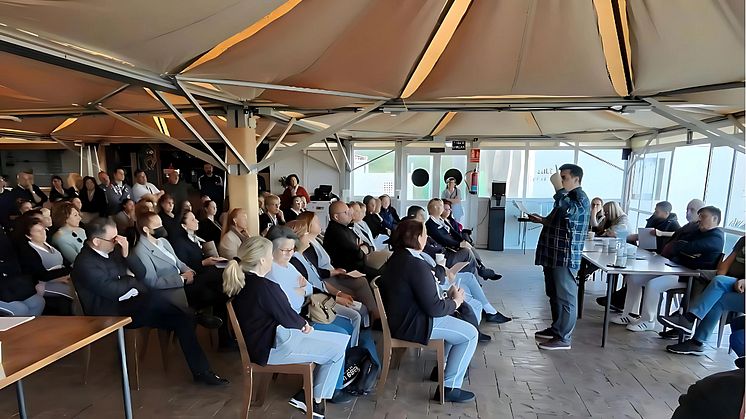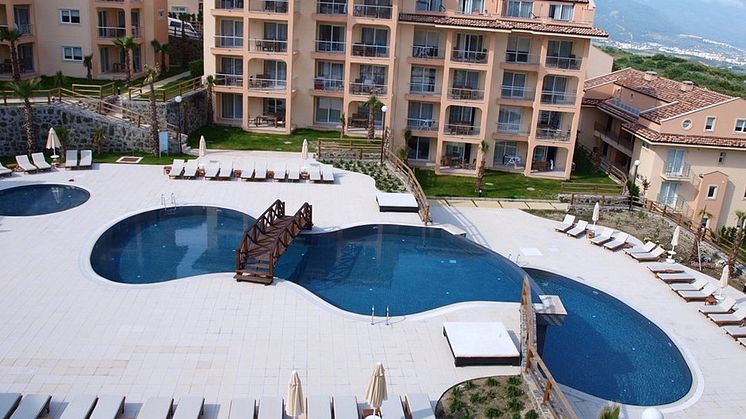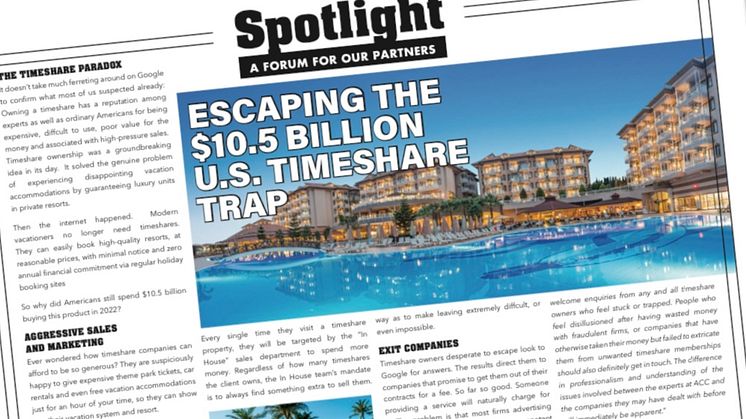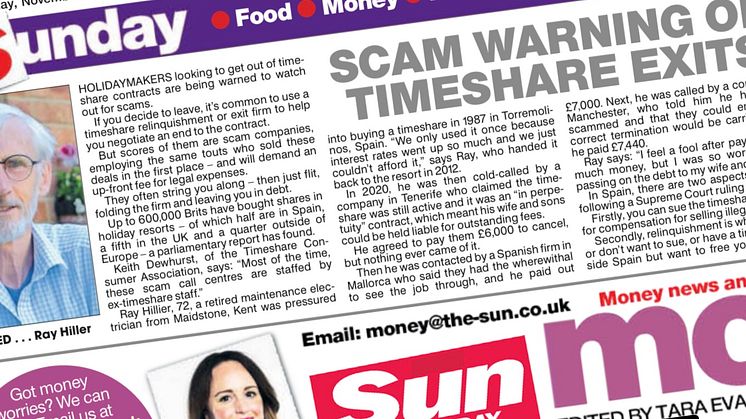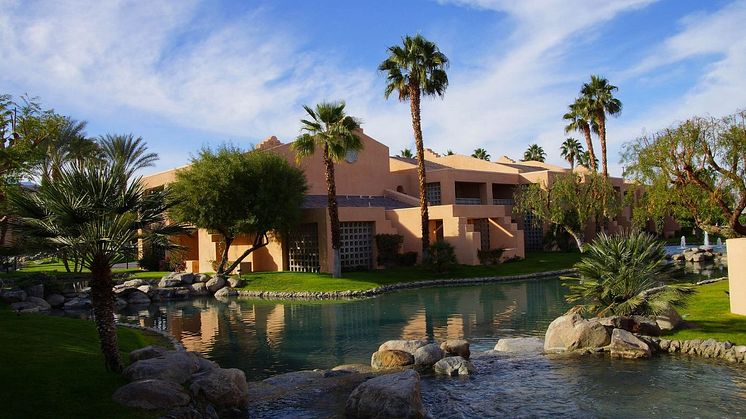
Press release -
Could timeshare adapt to present genuine value for money?
Timeshare is almost universally acknowledged by independent experts to be poor value for money, and something that needs expensive, high pressure sales seminars to convince people to buy it. But what if it went back to basics?
What timeshare was sold as
In the days before the internet, timeshare could be presented as anything that the salesperson thought would close the deal. Including as an actual property investment.
The very first timeshares were sold by a company called Hapimag, in a pristine Alpine ski resort called SuperDévoluy. After failing to sell the hotel as a whole entity, Hapimag approached the regular guests with the sales pitch: “No need to rent the room; buy the hotel, it's cheaper!"

The idea was: Maybe you would love to own a holiday property but couldn't afford the expensive price. Instead you could buy a small fraction of the property (divided into 52 weeks) and pay a lesser sum. You would 'own' your holidays by making this choice, but only the amount of holidays that you needed.
What it turned out to be
Most timeshare memberships, at least initially, were not property ownership at all. Instead what they conferred were 'rights of rotational occupancy.'
A new, one-week member paid more than enough money to purchase a 52nd share of the apartment, but this was sleight of hand. They actually paid for (basically) priority booking rights. In fact it committed them into paying to stay in that complex every year, sometimes forever. But they owned nothing.
If they ever tried to resell their ownership they couldn't. Because the membership didn't include actual property ownership, the resale value was nil.
In fact, expert help was needed to extricate a disappointed timeshare owner from the commitment of the annual fees.
More recently 'fractional' ownerships purported to address the issue, but they were far from a practical holiday investment despite sometimes being based on deeded property ownership.

Firstly they were incredibly overpriced, to the point that it would be pretty much impossible to sell the property and make a profit within a human lifetime.
Secondly even if fractional owners want to sell their shares, the process for doing so makes it so difficult as to be (again) impossible. Every single owner has to write to the club agreeing to the same terms at the same time. If any member fails to do this the membership is renewed for another term of up to 50 years.
So what's the answer?
How about if an apartment was really split into 52 actual ownership shares, and those shares sold at an appropriate price?

Wait, what? How would the developers make their insane profit if they couldn't manipulate people into paying over the odds for something that doesn't work?
Well, their loss would be your gain...
The cost
Our experts estimate that an average 2 bedroom timeshare apartment has a property market value of around £240,000. And if you divide that number by 52 you get £4500. Instead of £19,059: the average cost of a regular commercial timeshare.
Yes: £4500 is the cost that a genuine 52nd share in a timeshare unit could be sold at if you sold the units the same way as a regular property. The commissions would be less per sale, but the sales would be so much easier and more frequent that the developers could make up the money in volume of business.
The developer could even switch to regular, real-estate style advertising, avoiding the huge sums spent persuading people to attend regular timeshare presentations.

There would be a small extra cost to document the ownership with a Deed of Trust (or similar). But this would be a singular expense and would be the same per transaction whether a one week share was bought, or six months.
A genuine investment
This would be a product that is based on genuine ownership of a property. The general trend with property sold at correct market price is that in a relatively short amount of time it is almost guaranteed to increase in value.

The sale of the property could be managed to present the best possible return to the buyers. There could be a fixed date in (for example) ten years' time when the property will go on the market and the profits shared among the owners.
Anyone could sell their share in the property at any time, either privately, or through the club for a commission.
Maintenance
The inflated fees (averaging £1000 a year per one week membership) that members pay are yet another lucrative source of profit for regular timeshare sales companies. Our TAC experts calculate that a typical two bedroom apartment should not cost more than £150 per week including utilities, and very probably less. Whatever the actual cost the maintenance could be run at a minimal profit. Enough to pay an administrator perhaps.

Without the extortionate fees charged by a timeshare company, then the annual cost becomes considerably less than equivalent standard hotel/aparthotel accommodation.
Unlike a timeshare maintenance agreement, the cost of maintenance for the unit could be linked to retail price index or other fair and transparent inflationary measure.
Exchange
Provided the complex is up to exchange company standards, membership can be optionally purchased for those members who want to travel further afield and guarantee the same standard.
Currently 7Across offers the most flexible memberships: The most significant factor being that there are no annual fees to be a member.

There are also low exchange fees when you do use them.
All that is required for 7Across resort affiliation is an inspection visit from the company representatives, plus an annual check up from the same team. Provided resort standards are maintained, members can use the exchange system including bonus weeks, banking, reservations and discount hotel rates. All typical exchange membership benefits are available to 7Across members.
Will this ever happen?
"Free market Darwinism generally dictates that suppliers looking to get an edge on their competition are forced to look for ways to gradually provide better value for money than their rivals," notes Greg Wilson, CEO of European Consumer Claims.
"In Europe, regular timeshare sales have all but ceased due to protective consumer laws making high pressure sales difficult to action. So there could be scope in previous timeshare hotspots like Spain, Portugal, Greece, Cyprus and Malta for a better value proposition version of the product. One that does not need to rely on such intense manipulation of customers to force the sale."

In the USA, timeshare is still running rampage thanks to expensive marketing and intense high pressure sales presentations. However depending on which source you trust, up to 85% of timeshare owners here are unhappy with their purchase. If enough people get sufficiently outraged at being manipulated into making purchases that go against their best interests then sooner or later politicians have to listen and pass laws to protect consumers. In the same way as European powers have done.
"For now, its up to us to protect ourselves," says Wilson. "Let the buyer beware."
Are you an unhappy timeshare owner?
If you own a standard timeshare membership and feel like you have been mis-sold, get in touch with our team at the Timeshare Advice Centre.
If you feel that your membership no longer presents value, but you are struggling to escape, get in touch.
All consultations are free, in confidence and without obligation.

Related links
- Timeshare Advice Centre
- TAC contact page
- European Consumer Claims
- Andrew Cooper: Timeshare expert and philanthropist
- Fractional ownership: The new face of timeshare
- How do high pressure timeshare sales actually work?
- Timeshare: What It Is, How It Works, Types of Ownership
- Timeshare Owner Secrets Revealed
- Why are timeshare sales still thriving in the US, despite fizzling out in Europe?
- US timeshare investors suffer buyer’s remorse as fees pile up
- The timeshare expenses they DON'T tell you about...
- How do timeshare fee increases compare with the worldwide cost of living hikes?
Topics
Categories
Regions
TAC provides timeshare claims services, relinquishments expert advice and help
E: (for media enquiries): mark.jobling@ecc-eu.com
T: (for media enquiries): +44 2039962044
E: (for client enquiries) EUROPE: info@timeshareadvicecentre.co.uk USA: info@timeshareadvicecentre.us
T: EUROPE: +44 800 102 6070/+44 203 807 3388. USA: 1-888 203 5448/ 1-332 867 1213
Monday to Friday: UK timings: 9am-8pm. Saturday/Sunday closed. USA 9am -8pm EST. Sunday closed
Follow Timeshare Advice Centre UK on Facebook here. Timeshare Advice Centre US here
Follow Timeshare Advice Centre UK on Twitter here. Timeshare Advice Centre US here
Relevant websites for this article














